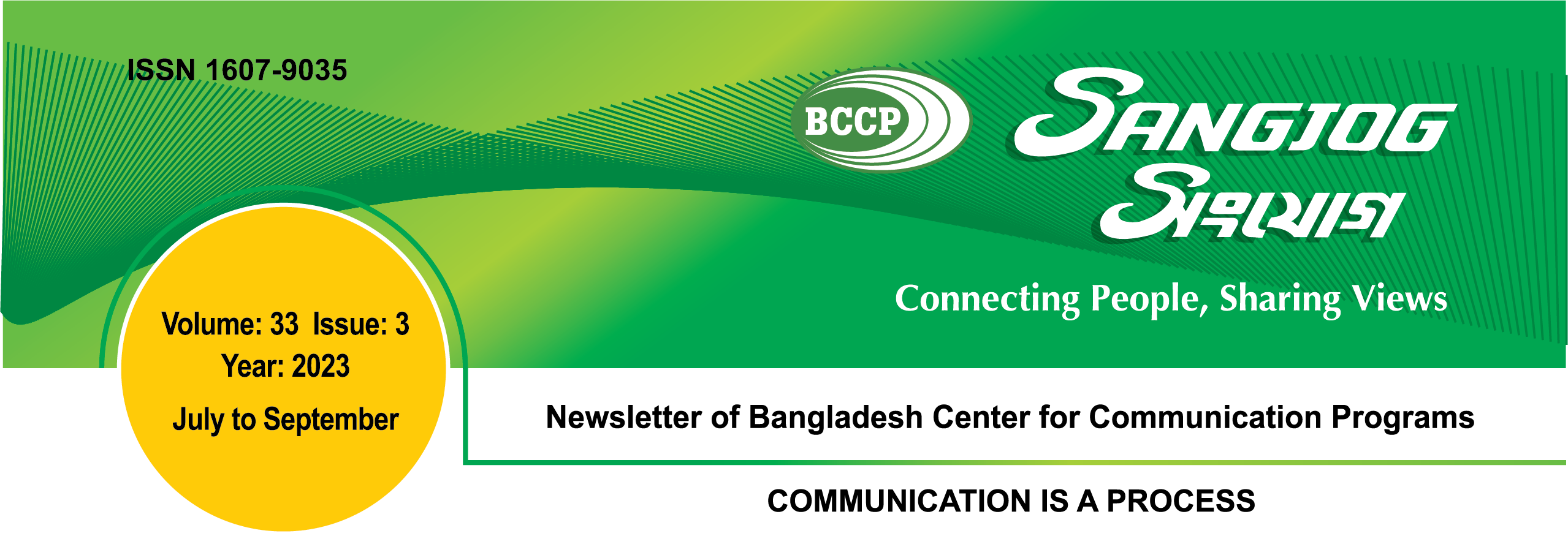

Developing student leadership programs in Bangladesh is crucial for empowering young people, addressing social challenges, and building a brighter future for the nation
Meher Afroze: Deputy Director, BCCP
Youth play a pivotal role in healthy community development. Youths are not only the future of this society or this country, but they are the ones who will lead the world. We know, the youths are the force having huge potential to play the most vital role in changing society assuming leadership role. Currently there are more youth than there are adults in our country, so the youth must have an active role in peace building. We all know that Youth is the most valuable phase of one’s life.
 It is an age recognized by so many traits, such as: heroism, stimulation, curiosity, positive attitude, abundant energy, zeal and much more. At this age, the youths usually tend to be driven by fantasy or freedom while choosing a path or making decisions. Considering the vulnerability of being derailed by many adverse factors at this age, the youths be guided accordingly, so that they can exercise their energy and power cautiously. They are also full of strength and intellectual capability, which, if properly utilized, could assist in turning the invisible into visible, the hardships to triumph and the hard work to success.
It is an age recognized by so many traits, such as: heroism, stimulation, curiosity, positive attitude, abundant energy, zeal and much more. At this age, the youths usually tend to be driven by fantasy or freedom while choosing a path or making decisions. Considering the vulnerability of being derailed by many adverse factors at this age, the youths be guided accordingly, so that they can exercise their energy and power cautiously. They are also full of strength and intellectual capability, which, if properly utilized, could assist in turning the invisible into visible, the hardships to triumph and the hard work to success.
- community service, volunteer work, or advocacy for social and political issues
- students may miss out on experiences that help them discover their potential and build self-esteem
- students may have a limited ability to influence decision-making processes that affect their lives
- some students may be more susceptible to negative peer influences, such as peer pressure to engage in risky behaviors or join groups with harmful agendas
- a reduced social cohesion may lead students for not coming into the attachments of promoting diversity, tolerance, and cooperation among students from different backgrounds
- failing to utilize missed opportunities for networking with peers, mentors, and professionals which can be valuable for future educational and career opportunities.
BCCP undertook an initiative with the title " Bangladesh Private University Student Leadership Development Workshop" for three selected private universities of Dhaka City with the 300 students of 1st year & 2nd year @100 students from each university in September 2012. Through six theme-based series of SLD workshops and Capstone Seminar the intervention brought a group of students together to shape up their knowledge, perception,
 attitude, and preferences related to pluralism, diversity, non-violent conflict resolution and inter-religious affairs. They were also provided with life skills essential for decision-making, problem solving, creative thinking, self-awareness and coping with stress and emotion.
Moreover, to utilize leadership experience and preserve the takeaway of the workshop, a Knowledge Management Database (KMD) was developed.
During the workshops the participants were given an assignment to take up particular social issues and take necessary action to control them.
attitude, and preferences related to pluralism, diversity, non-violent conflict resolution and inter-religious affairs. They were also provided with life skills essential for decision-making, problem solving, creative thinking, self-awareness and coping with stress and emotion.
Moreover, to utilize leadership experience and preserve the takeaway of the workshop, a Knowledge Management Database (KMD) was developed.
During the workshops the participants were given an assignment to take up particular social issues and take necessary action to control them.
 Some groups presented a drama to grab people’s attention, some went directly to the victims of the social issues, and some went to other educational institutions to gather more people to help them in controlling the social issue. Among the groups the ten best groups were awarded individually a “Community Role Model” badge to acknowledge their sincere efforts to create a solid and structured plan to benefit society.
Some groups presented a drama to grab people’s attention, some went directly to the victims of the social issues, and some went to other educational institutions to gather more people to help them in controlling the social issue. Among the groups the ten best groups were awarded individually a “Community Role Model” badge to acknowledge their sincere efforts to create a solid and structured plan to benefit society.
 These badges inspired the recipients to make a commitment that they would continue to stive in the community.
Student & Police Engagement through the Student Leadership Development Workshops
These badges inspired the recipients to make a commitment that they would continue to stive in the community.
Student & Police Engagement through the Student Leadership Development Workshops To encourage leadership & capacity building of the university students as well as strengthening the connection among the students and law enforcement agencies, BCCP had undertaken the program titled “Rajshahi Student & Police Engagement-Student Leadership Development Workshops” in 2016 as a follow-on program of the " Bangladesh Private University Student Leadership Development Workshop". The objective of the program was to strengthen the relationship between students and police and among other things promote peaceful resolution of conflicts.
 Integration of the police in the Rajshahi SLDW program was expected to form a student-police relationship that will provide insights into each other’s viewpoint, create tolerance, and motivate them to help maintain law and order in the society.
Student Leadership Development Program in Chottogram
Integration of the police in the Rajshahi SLDW program was expected to form a student-police relationship that will provide insights into each other’s viewpoint, create tolerance, and motivate them to help maintain law and order in the society.
Student Leadership Development Program in Chottogram
The fruitful results generated from the RSLDW have inspired BCCP to take up the initiative to conduct another successful Student Leadership Development
 Program in Chottogram to contribute to strengthening peace and harmony in the society. The guiding themes of the workshops and seminar were Patriotism and vision for Bangladesh, Role of Youth in Community Development and Peacebuilding programs, Religious Tolerance and Interfaith Dialogue, Leadership, Capacity Building and Skills Developments etc.
SLDW program in Sylhets
Program in Chottogram to contribute to strengthening peace and harmony in the society. The guiding themes of the workshops and seminar were Patriotism and vision for Bangladesh, Role of Youth in Community Development and Peacebuilding programs, Religious Tolerance and Interfaith Dialogue, Leadership, Capacity Building and Skills Developments etc.
SLDW program in Sylhets Having a great experience of SLDW program in Rajshahi and Chittagong program, BCCP continues to promote leadership and undertook another similar
 program in Sylhet in 2019 under USAID’s Obirodh:Road to Tolerance Program .
The program found an effective way to contain existing negative ideologies and turn them into positive thinking among the youth to curb the instability and violence in society and promote peace.
program in Sylhet in 2019 under USAID’s Obirodh:Road to Tolerance Program .
The program found an effective way to contain existing negative ideologies and turn them into positive thinking among the youth to curb the instability and violence in society and promote peace. Moving across divisions with this aim, BCCP has utilized lessons learned from Dhaka, Rajshahi and Chattogram programs to design the next set of programs for Sylhet. Thus, the Sylhet Student Leadership Development Program has incorporated some new activities and employed effective means with the help of expert educators. A new concept Peer Learning was introduced at the Sylhet SLDW through which participants were imparted their learning at experience at other schools and colleges in the community and to build relationship between students, police, and community. Campus based events were designed to assist participants share their workshop experiences in an entertaining manner.
 The program incorporated some outreach events to aware the community regarding Prevention of Violence Extremism (PVE). The objective of the event was to build relationships and networks among the community.
2nd round SLDW program Rajshahi and Chottogram
The program incorporated some outreach events to aware the community regarding Prevention of Violence Extremism (PVE). The objective of the event was to build relationships and networks among the community.
2nd round SLDW program Rajshahi and Chottogram After the Sylhet SLDW in 2019 BCCP implemented SLDW program in Rajshahi for the 2nd round in 2020-2021 and in Chottogram in 2022-2023. Thus, a total of 1050 students and 150 Police members have been directly involved in the SLDW program.
 Participants’ learning was more pronounced in the actions they took following the workshops. Students have carried out a number of noble activities in their communities and also with the local police department in many of the national events. With a little nudge, they made a big difference. Bringing the police and students together opened the gates to communal harmony and peace.
It is truly commendable that after the workshops ended the participants kept their rapport alive and have taken initiatives to help the “Community Student Policing Forums” have been established in various educational institutions, which help the students to easily report any behavior/incident that seems illegal or reprehensible in nature.
Through the implementation of Student Leadership Develop Program in four divisional districts with the students of public university/college and private university and police members,
Participants’ learning was more pronounced in the actions they took following the workshops. Students have carried out a number of noble activities in their communities and also with the local police department in many of the national events. With a little nudge, they made a big difference. Bringing the police and students together opened the gates to communal harmony and peace.
It is truly commendable that after the workshops ended the participants kept their rapport alive and have taken initiatives to help the “Community Student Policing Forums” have been established in various educational institutions, which help the students to easily report any behavior/incident that seems illegal or reprehensible in nature.
Through the implementation of Student Leadership Develop Program in four divisional districts with the students of public university/college and private university and police members,
 BCCP not only did an outstanding job for the youths but also achieved certain things for the organizational benefits, such as; a strong network with the local government officials, students and educational institute has been developed through the implementation of the SLDW program. BCCP can be benefited immensely from this network as because of this good relationship BCCP can now easily take help from those stakeholders to implement other project activities. Without having a good relationship prior to the starting of a program, it is often challenging to manage certain things, such as: getting approval from the concerned personnel, reaching out to target audience, getting authentic and relevant information on specific issues, etc.
Through the conduction of the workshop program, a pleasant relationship has built between SLDW - BCCP team and the youth participants. Many of them have expressed their keen interest to work with BCCP after their graduation. All these interested students were found enthusiastic towards the activities of BCCP. Thus, BCCP could have a bunch of motivated, energetic, young professionals in the future.
The outcome of the SLDW program
BCCP not only did an outstanding job for the youths but also achieved certain things for the organizational benefits, such as; a strong network with the local government officials, students and educational institute has been developed through the implementation of the SLDW program. BCCP can be benefited immensely from this network as because of this good relationship BCCP can now easily take help from those stakeholders to implement other project activities. Without having a good relationship prior to the starting of a program, it is often challenging to manage certain things, such as: getting approval from the concerned personnel, reaching out to target audience, getting authentic and relevant information on specific issues, etc.
Through the conduction of the workshop program, a pleasant relationship has built between SLDW - BCCP team and the youth participants. Many of them have expressed their keen interest to work with BCCP after their graduation. All these interested students were found enthusiastic towards the activities of BCCP. Thus, BCCP could have a bunch of motivated, energetic, young professionals in the future.
The outcome of the SLDW program
- Students felt better prepared, more confident, participated more in extracurricular activities and enacted more effective leadership practices, which will be helpful in transferring skill by the youth to others.
- The program created a network for the participants to exchange their ideas and opinions with each other as well as with the police members.
- Through the assignment activities for the seminar, the students not only learned about some unknown yet important topics but also were able to showcase what they could do for bringing a positive change in the society.
- Through the assignments, they shared insight about how they came up with their ideas and how effective the workshop program was for them to perform with excellence. They also explained how their activities can be effective in eliminating social issues in future.
 way of job to serve the community and the nation. Many of them got themselves involved in social development programs which includes online children education programs.
A student leadership development program can play a significant role in contributing to social development in Bangladesh by empowering young leaders with the skills, knowledge, and values they need to address various social and community challenges. As there are numerous social challenges persist in Bangladesh, a well-designed student leadership development program can be a catalyst for positive change. It not only benefits individual students but also has the potential to contribute significantly to the country's social progress and development. Student leadership programs play a crucial role in developing the leadership skills, social consciousness, and civic engagement of young individuals. It is essential for educational institutions and policymakers to recognize the importance of student leadership development and consider implementing structured programs that empower students to become responsible, engaged, and effective leaders in their communities and beyond.
way of job to serve the community and the nation. Many of them got themselves involved in social development programs which includes online children education programs.
A student leadership development program can play a significant role in contributing to social development in Bangladesh by empowering young leaders with the skills, knowledge, and values they need to address various social and community challenges. As there are numerous social challenges persist in Bangladesh, a well-designed student leadership development program can be a catalyst for positive change. It not only benefits individual students but also has the potential to contribute significantly to the country's social progress and development. Student leadership programs play a crucial role in developing the leadership skills, social consciousness, and civic engagement of young individuals. It is essential for educational institutions and policymakers to recognize the importance of student leadership development and consider implementing structured programs that empower students to become responsible, engaged, and effective leaders in their communities and beyond.

EMCRP project visit by the CEO-BCCP:
“We now feel more motivated and aligned with the organization's mission, eagerly looking forward to implementing the discussed strategies and improvements.”
Fatimatuz Zuhura Akhi, Field Officer, CAS for EMCRP, LGED
BCCP Ukhiya Field Office, Cox’s Bazar
September 09, 2023: Mr. Mohammad Shahjahan the Director and CEO of Bangladesh Center for Communication Programs (BCCP) visited to the Communication Awareness Service (CAS) team for Emergency Multi-Sector Rohingya Crisis Response Project (EMCRP) under LGED at Cox's Bazar. He participated in a discussion meeting with the team on the program's progress, challenges, and future prospects.
The Emergency Multi-Sector Rohingya Crisis Response Project (EMCRP) is a World Bank financed project targeting both the forcibly displaced Myanmar nationals-FDMN and the host community of eight Upazila under the Cox’s Bazar District. The project activities include construction of internal roads, bridge, culvert, school cum cyclone shelter, multipurpose community and service center, solar streetlight, installation of lighting protection system, construction of hat bazar for the improvement of lifestyle of the local people in Cox’s Bazar. The project is being implemented jointly by the LGED, DPHE and Ministry of Disaster Management and Relief (MoDMR). Bangladesh Center for Communication Programs (BCCP), has been providing Communication and Awareness Service (CAS) to complement and strengthen the communication capacity of LGED and to aware FDMN and the host community to use the service facilities with care. During this trip, Mr. Shahjahan participated in the CAS team orientation and performance review meeting for the EMCRP LGED project which was joined by Mr. Abu Hasib Mostafa Jamal, Senior Deputy Director and Team Leader of CAS for EMCRP, and Mr. Shahabuddin, Program Manager for CAS for EMCRP along with the entire field team of the Ukhiya field office Mr. Ridoanur Rahman, Deputy Team Leader, Mr. Md. Nesarul Islam Jewel, Awareness Specialist- (Infrastructure), Ms. Aparajita Micheng, Social Awareness Specialist, Mr. Abu Huraira, Field Officer, Fatematuz Zuhra Akhi, Field officer and Mofizur Rahman, Field Officer and Mr. Md. Arif Ullah, FCA.
Raising Awareness for Responsible Use of Infrastructure Services will increase beneficiary involvement
- Upazila Engineer, LGED, Ramu, Cox’s Bazar
Ramu, August 1, 2023: - A dialogue event to increase coordination with Upazila based stakeholders organized by the Bangladesh Centre for Communication Programs (BCCP) was held in the Ramu Upazila Conference Hall. This event, a symphony of Upazila stakeholders, echoed with the purpose of the necessity of Communication and Awareness Services (CAS) provided by BCCP; focused on the Emergency Multi-Sector Rohingya Crisis Response Project (EMCRP) implemented by the Local Government Engineering Department (LGED) in Cox’s Bazar, supported by the World Bank.
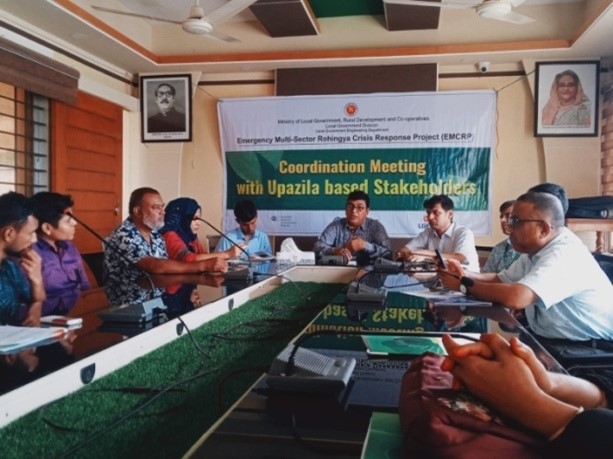 The event was chaired by Mr. Monzur Hasan Bhuyan, the Upazila Engineer of LGED Ramu. While Ms. Fahmida Mostafa, UNO Ramu was Chief Guest. Mr. Abu Hasib Mostafa Jamal, Senior Deputy Director of BCCP and Team Leader-CAS for EMCRP, graced the occasion as a special guest and inaugurated the event. He affirmed, "BCCP is here to reinforce EMCRP-LGED's communication strategy and raise awareness among Foursefuly Displaced Myanmar Nationals (FDMN) and the host community regarding prudent usage of service facilities”. Mr. Monzur Hasan Bhuyan, the Upazila Engineer of LGED highlighted the infrastructural advancements of EMCRP in Ramu Upazila. He urged the necessity of strengthening awareness activities for the responsible utilization of infrastructure service facilities provided by EMCRP, LGED. In this event Mr. Ridoanur Rahman, Deputy Team Leader, CAS for EMCRP, LGED presented a keynote paper on the communication activities.
Distinguished guests included Mr. Kamal Shamsuddin Ahamed, Chairman of Jouarianala Union Parishad; Mr. Mofizur Rahaman, Chairman of Razarkol Union Parishad; Mr. Al Gulib, Upazila Social Service Officer; Ms. Umme Suraya Amin, Upazila Women Affairs Officer; Md. Nur A Alom Mazumdar, Upazila Youth Development Officer; Md. Shahabuddin, Program Manager at BCCP; and Mr. Shouab Sayed, General Secretary of Ramu Press Club and others.
Mr. Kamal Shamsuddin Ahamed, Chairman of Jouarianala UP, stressed, "Our community should understand the importance of utilizing government services. Particularly during cyclones, raising awareness becomes crucial as vulnerable individuals hesitate to seek shelter. We express gratitude to BCCP for their efforts to aware the community people regarding this”. Mr. Al Gulib, the Upazila Social Service Officer, emphasized, "Community well-being hinges on social awareness. All stakeholders should come together in support of BCCP's project implementation." Ms. Umme Suraya Amin, Upazila Women Affairs Officer, highlighted the effectiveness of courtyard meeting in fostering awareness among remote communities.
The Chief Guest hopes to see an effective awareness program in Ramu. The deliberations culminated in a unanimous resolution - the implementation of Communication and Awareness Services (CAS) and related programs within the local sphere. Regular awareness programs remain the basis of enlightening the local populace; no alternative route exists to kindle this vital awareness.
There were some news publications in local newspapers as below:
The event was chaired by Mr. Monzur Hasan Bhuyan, the Upazila Engineer of LGED Ramu. While Ms. Fahmida Mostafa, UNO Ramu was Chief Guest. Mr. Abu Hasib Mostafa Jamal, Senior Deputy Director of BCCP and Team Leader-CAS for EMCRP, graced the occasion as a special guest and inaugurated the event. He affirmed, "BCCP is here to reinforce EMCRP-LGED's communication strategy and raise awareness among Foursefuly Displaced Myanmar Nationals (FDMN) and the host community regarding prudent usage of service facilities”. Mr. Monzur Hasan Bhuyan, the Upazila Engineer of LGED highlighted the infrastructural advancements of EMCRP in Ramu Upazila. He urged the necessity of strengthening awareness activities for the responsible utilization of infrastructure service facilities provided by EMCRP, LGED. In this event Mr. Ridoanur Rahman, Deputy Team Leader, CAS for EMCRP, LGED presented a keynote paper on the communication activities.
Distinguished guests included Mr. Kamal Shamsuddin Ahamed, Chairman of Jouarianala Union Parishad; Mr. Mofizur Rahaman, Chairman of Razarkol Union Parishad; Mr. Al Gulib, Upazila Social Service Officer; Ms. Umme Suraya Amin, Upazila Women Affairs Officer; Md. Nur A Alom Mazumdar, Upazila Youth Development Officer; Md. Shahabuddin, Program Manager at BCCP; and Mr. Shouab Sayed, General Secretary of Ramu Press Club and others.
Mr. Kamal Shamsuddin Ahamed, Chairman of Jouarianala UP, stressed, "Our community should understand the importance of utilizing government services. Particularly during cyclones, raising awareness becomes crucial as vulnerable individuals hesitate to seek shelter. We express gratitude to BCCP for their efforts to aware the community people regarding this”. Mr. Al Gulib, the Upazila Social Service Officer, emphasized, "Community well-being hinges on social awareness. All stakeholders should come together in support of BCCP's project implementation." Ms. Umme Suraya Amin, Upazila Women Affairs Officer, highlighted the effectiveness of courtyard meeting in fostering awareness among remote communities.
The Chief Guest hopes to see an effective awareness program in Ramu. The deliberations culminated in a unanimous resolution - the implementation of Communication and Awareness Services (CAS) and related programs within the local sphere. Regular awareness programs remain the basis of enlightening the local populace; no alternative route exists to kindle this vital awareness.
There were some news publications in local newspapers as below:
রামুতে ইএমসিআরপি প্রকল্পের স্টেকহোল্ডারদের নিয়ে বিসিসিপি’র সমন্বয় সভা অনুষ্ঠিত – Alokito Pah ar
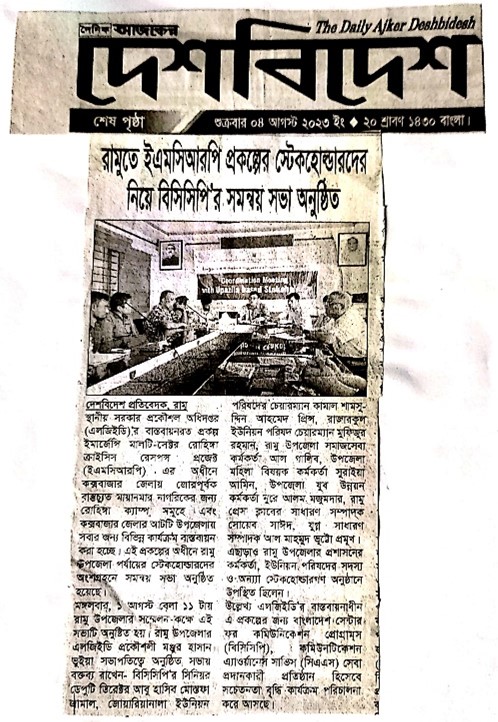
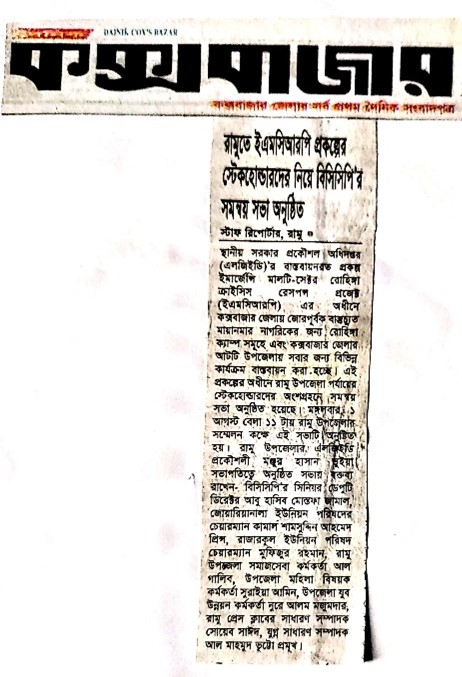
“𝐞-𝐆𝐏 𝐩𝐥𝐚𝐲𝐬 𝐯𝐢𝐭𝐚𝐥 𝐫𝐨𝐥𝐞 𝐭𝐨 𝐞𝐧𝐬𝐮𝐫𝐞 𝐯𝐚𝐥𝐮𝐞 𝐟𝐨𝐫 𝐦𝐨𝐧𝐞𝐲 𝐢𝐧 𝐩𝐮𝐛𝐥𝐢𝐜 𝐩𝐫𝐨𝐜𝐮𝐫𝐞𝐦𝐞𝐧𝐭’
In order to bring transparency and accountability in public procurement, the government has made breakthrough in implementation of electronic government procurement or e-GP, which is playing an important role in ensuring value for money.
This is also contributing effectively to achieving the Sustainable Development Goals (SDGs) by 2041 and building a Smart Bangladesh.
Director (Joint Secretary) of Central Procurement Technical Unit (CPTU) under Implementation Monitoring Evaluation Division (IMED) of Ministry of Planning Md. Aknor Rahman, Ph.D. said this while speaking as the chief guest at a day-long workshop of Government-Tenderers Forum (GTF) held on July 30, 2023 in Panchagarh. Panchagarh District Commissioner and District Magistrate Mr. Md. Zahurul Islam presided over the workshop held in the conference room of deputy commissioner.
To read and watch full news, please click the link below:
Client Centered Approach brought as key focus while BCCP provided a 4-day ToT to the ICMH professionals for improved Client-Provider interactions
In quest of continuous effort of Bangladesh center for Communication Programs (BCCP) to enhance capacity building of the Bangladeshi professionals working in the social development field it has provided a 4-day Training of Trainers (ToT) to the Institute for Child and Mother Health (ICMH) professionals for improved Client-Provider interactions.
This ToT program with a dedicated curriculum have been planned, developed and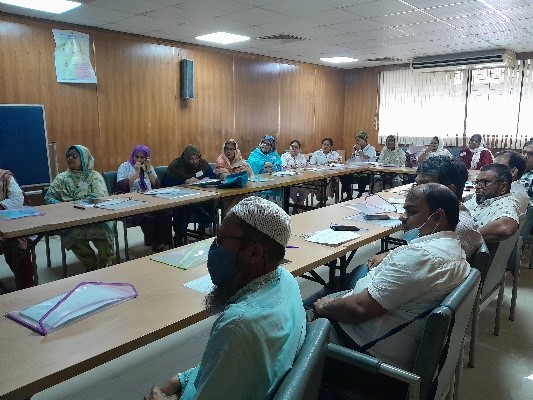 implemented keeping client centered approach as the key focus for improved Client-Provider interactions that has envisaged to be the center point of the health service providers while provisioning health services from their institute.
A number of 24 professionals comprised of 19 medical doctors and 5 nursing supervisors participated in this day-long ToT held on and from July 30 through August 02, 2023 in one of the Institute’s training room. The formal sessions of the ToT were initiated having a brief inaugural session held on July 30, 2023 attended by Prof. Dr. M A Mannan, Executive Director, ICMH as Chief Guest while Prof. Dr. Hasrat Jahan, Joint Director, ICMH were there as Special Guest.
A wide range of training methodologies, having a combination of Reflection, Discussion and Synthesis (RDS) approaches was adopted and followed in this training course. Key methodologies and key principles of conduction of the course were followed as:
implemented keeping client centered approach as the key focus for improved Client-Provider interactions that has envisaged to be the center point of the health service providers while provisioning health services from their institute.
A number of 24 professionals comprised of 19 medical doctors and 5 nursing supervisors participated in this day-long ToT held on and from July 30 through August 02, 2023 in one of the Institute’s training room. The formal sessions of the ToT were initiated having a brief inaugural session held on July 30, 2023 attended by Prof. Dr. M A Mannan, Executive Director, ICMH as Chief Guest while Prof. Dr. Hasrat Jahan, Joint Director, ICMH were there as Special Guest.
A wide range of training methodologies, having a combination of Reflection, Discussion and Synthesis (RDS) approaches was adopted and followed in this training course. Key methodologies and key principles of conduction of the course were followed as:

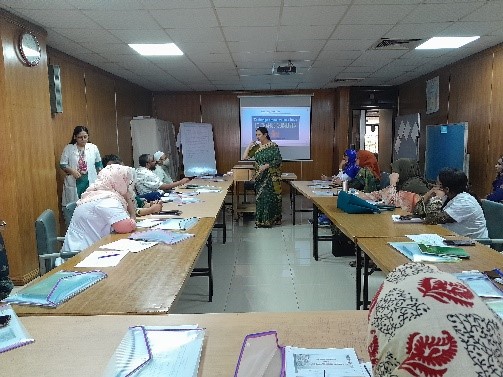 raising issues and taking part in various courses of the training event including the group work, role play and group presentation. Their attention and participation have contributed to the development of their skill as were found to have a remarkable increase that came out through the pre and post test assessments. It was found that the increase was almost double as the average scoring at the pre-test found 15.44 have reached to 29.09 at the post-test.
It is envisaged that the training program will bring a positive change to
raising issues and taking part in various courses of the training event including the group work, role play and group presentation. Their attention and participation have contributed to the development of their skill as were found to have a remarkable increase that came out through the pre and post test assessments. It was found that the increase was almost double as the average scoring at the pre-test found 15.44 have reached to 29.09 at the post-test.
It is envisaged that the training program will bring a positive change to
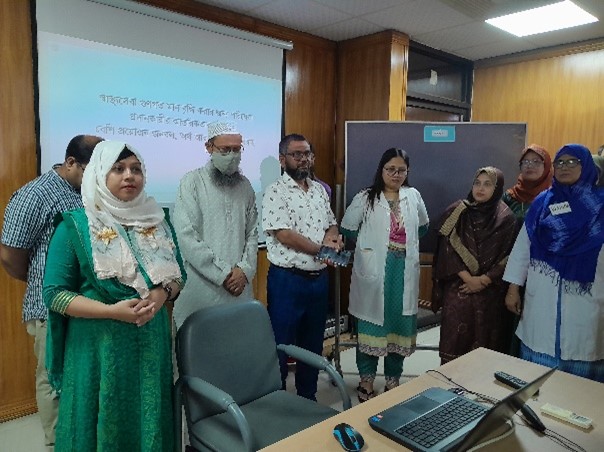 undertake the Client Centered Approach by the health service providers which will be profusely contributing towards producing satisfied customers while it is expected that the quality of care will become the essential outcome of the customer satisfaction. As the training curriculum have been planned to be a cascaded model and trainees have been oriented to work as a trainer for the next level of training, is expected to bring a sustainable impact enhancing the better and improved Client-Provider interactions.
The concluding session was marked with the participants comment highlighting different aspects of quality training which will be benefitting them in five-ways as to:
undertake the Client Centered Approach by the health service providers which will be profusely contributing towards producing satisfied customers while it is expected that the quality of care will become the essential outcome of the customer satisfaction. As the training curriculum have been planned to be a cascaded model and trainees have been oriented to work as a trainer for the next level of training, is expected to bring a sustainable impact enhancing the better and improved Client-Provider interactions.
The concluding session was marked with the participants comment highlighting different aspects of quality training which will be benefitting them in five-ways as to: - Improving the quality of interactions and counselling
- Enhance client satisfaction
- Improved quality of care for the clients
- Transfer of the skills to the fellow colleagues
- Bringing sustainable impact in the improved health service delivery system.
Promoting Awareness for the Community People of Maheshkhali
Promoting Awareness for the Community People of Maheshkhali Maheshkhali Upazila, July 26, 2023: An important discussion meeting was organized by the Bangladesh Center for Communication Programs (BCCP) at the Maheshkhali Upazila conference room, aimed at fostering communication and awareness for the Emergency Multi-Sector Rohingya Crisis Response Project (EMCRP). The project, supported by the World Bank and implemented by the Local Government Engineering Department (LGED); BCCP seeks to enhance the caring behavior of beneficiaries while using the facilities by a comprehensive strategic communication program.
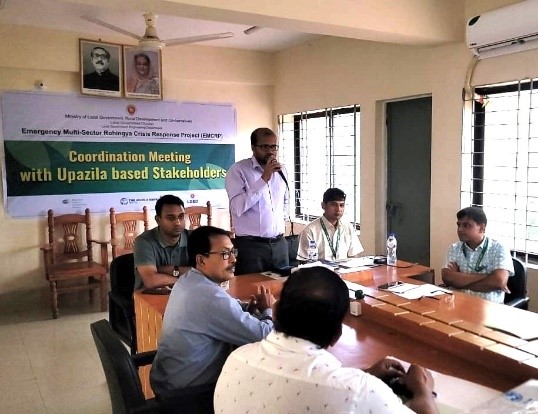 The meeting brought together stakeholders from various sectors within the upazila and was chaired by Mr. Sabuj Kumar Dey, the Upazila Engineer, LGED. The honorable Chief Guest, Mr. Md. Yaseen, Upazila Nirbahi Officer (UNO) of Maheshkhali, emphasized the importance of creating awareness among the local population regarding the use of government facilities provided under the EMCRP.
Mr. Dey highlighted the developmental steps made under the EMCRP and expressed confidence that the Communication and Awareness Services (CAS) programs, executed by BCCP, would significantly contribute to sustaining these advancements. UNO Mr. Yaseen echoed this sentiment, affirming that the residents of Maheshkhali upazila should make the most of the government's substantial budget allocation for infrastructure development.
Abu Hasib Mostafa Jamal, Senior Deputy Director at BCCP and Team Leader of CAS, EMCRP, emphasized the purpose of the meetingthat aims to sensitive and careful utilization of the government's resources provided through the EMCRP for local infrastructural development. ‘Service facilities for me, I use with care’ is the tagline for CAS campaign, Mr. Hasib added. He seeks support and engagement of the stakeholders for the CAS activities. In this event Mr. Md. Nesarul Islam Jewel, Awareness Specialist (Infrastructure), CAS for EMCRP, LGED presented a keynote paper on the communication activities.
Distinguished guests included Mr. Md. Sahabuddin, Program Manager at BCCP's CAS, EMCRP, as well as representatives from the local education office, school headteachers, and Union Parishad members. Their valuable insights underscored the necessity of regular awareness initiatives to foster effective local utilization of government facilities.
In conclusion, the meeting emphasized the vital role of Communication and Awareness Services in ensuring that local residents are well-informed about and can effectively access government services. Continuous awareness programs were deemed essential to empower the community to use these resources responsibly, ensuring sustained progress.
The meeting brought together stakeholders from various sectors within the upazila and was chaired by Mr. Sabuj Kumar Dey, the Upazila Engineer, LGED. The honorable Chief Guest, Mr. Md. Yaseen, Upazila Nirbahi Officer (UNO) of Maheshkhali, emphasized the importance of creating awareness among the local population regarding the use of government facilities provided under the EMCRP.
Mr. Dey highlighted the developmental steps made under the EMCRP and expressed confidence that the Communication and Awareness Services (CAS) programs, executed by BCCP, would significantly contribute to sustaining these advancements. UNO Mr. Yaseen echoed this sentiment, affirming that the residents of Maheshkhali upazila should make the most of the government's substantial budget allocation for infrastructure development.
Abu Hasib Mostafa Jamal, Senior Deputy Director at BCCP and Team Leader of CAS, EMCRP, emphasized the purpose of the meetingthat aims to sensitive and careful utilization of the government's resources provided through the EMCRP for local infrastructural development. ‘Service facilities for me, I use with care’ is the tagline for CAS campaign, Mr. Hasib added. He seeks support and engagement of the stakeholders for the CAS activities. In this event Mr. Md. Nesarul Islam Jewel, Awareness Specialist (Infrastructure), CAS for EMCRP, LGED presented a keynote paper on the communication activities.
Distinguished guests included Mr. Md. Sahabuddin, Program Manager at BCCP's CAS, EMCRP, as well as representatives from the local education office, school headteachers, and Union Parishad members. Their valuable insights underscored the necessity of regular awareness initiatives to foster effective local utilization of government facilities.
In conclusion, the meeting emphasized the vital role of Communication and Awareness Services in ensuring that local residents are well-informed about and can effectively access government services. Continuous awareness programs were deemed essential to empower the community to use these resources responsibly, ensuring sustained progress.
Editorial: Empowering the youth - a collective responsibility
Youth, often addressed as the leads of our nation's future, use an immense transformative power capable of boosting healthy community development and asserting leadership on both the national and global stages. They epitomize courage, boundless energy, and a limitless thirst for change. However, in this youth phase, associated both with opportunities and challenges, has vulnerabilities as well. In a world evolving at fast speed, our young minds are exposed to a multitude of external influences, both constructive and detrimental, that can chart the course of their lives.
To empower our youth, we must, first and foremost, recognize their immense potential while acknowledging the barriers they face. Recent census data underlines the fact that a substantial portion of our youth resides in rural areas, often dealing with restricted access to quality education and meaningful employment prospects. Connecting these gaps is not just a matter of choice but an urgent necessity for their holistic development. The digital age, with its immense scope for connectivity and information access, has accompanied a new era of opportunities. Yet, it has also cast a shadow, exposing our youth to emerging risks, particularly becoming victim of cybercrime and online misinformation. Nurturing their digital well-being and furnishing them with the critical thinking skills required to navigate the complexities of the digital space are obligations. The "Student Leadership Development Workshops" program supported by the US Embassy, initiated by BCCP in 2013 and continuing till now, empowering our youth. These workshops not only equip young individuals with essential life skills but also instill a profound sense of responsibility towards their communities. By addressing important issues such as pluralism, diversity, and conflict resolution, they provide a necessary platform for our youth to engage in meaningful discourse and catalyze positive change. While these initiatives indeed have replicability, we must now focus on ensuring their sustainability and scalability. With the youth population kept its continuous growth, it is imperative to expand the reach of such programs to cater to the evolving needs of our youth. Our youth represent an invaluable asset for our nation's progress. Empowering them and steering them toward responsible citizenship is not a mere option; it is a moral imperative. By investing in their education, offering them avenues of opportunity, and safeguarding their well-being, we can harness their supreme potential to not only illuminate the path for Bangladesh but also serve as signs of hope for the world.

Rohingya youth long for a future beyond the barbed wire
Rohingya children hold placards as they gather at the Kutupalong refugee camp to mark the fifth anniversary of their fleeing from neighbouring Myanmar to escape a military crackdown in 2017, in Cox's Bazar, Bangladesh, on August 25, 2022 read more...

Rohingya: Gang violence stalks world's largest refugee camp
Sounds of gunfire keep Modina Khatun awake every night in Cox's Bazaar Bangladesh - the world's largest refugee camp. She fears that spiralling gang violence there will make a widow of another Rohingya woman like herself, with young children to feed. read more...

Timeline: A visual history of the Rohingya refugee crisis
Five years after the mass exodus of Rohingya people from Myanmar, their future looks as uncertain as ever. Uprooted from their homeland by a campaign of targeted violence launched by the Myanmar military in August 2017, some 700,000 ethnic Rohingya refugees sought safety just across the border in Bangladesh. read more...

Rohingya Refugee Crisis Explained
In August 2017, armed attacks, massive scale violence, and serious human rights violations forced thousands of Rohingya to flee their homes in Myanmar’s Rakhine State. read more...

Ten countries and territories saw severe flooding in just 12 days. Is this the future of climate change?
Hong Kong CNN — September started with a typhoon that ripped through Hong Kong, uprooting trees and flooding the city. It was the first of a slew of extreme weather events that have hit ten countries and territories in just 12 days – the most catastrophic being the floods in Libya read more...

Climate change: Broken records leave Earth in 'uncharted territory' -
A series of climate records on temperature, ocean heat, and Antarctic sea ice have alarmed some scientists who have said their speed and timing is unprecedented. Dangerous heatwaves in Europe could break further records, the UN has said. It is hard to immediately link these events to climate change because weather - and oceans - are so complex. read more...

Bangladesh’s worst ever dengue outbreak a ‘canary in the coal mine’ for climate crisis, WHO expert warns territory' –
Bangladesh is battling its worst dengue outbreak on record, with more than 600 people killed and 135,000 cases reported since April, the World Health Organization said Wednesday, as one of its experts blamed the climate crisis and El Nino weather pattern for driving the surge. read more...

Bangladesh Prepares for a Changing Climate
Bangladesh continues to make progress in reducing poverty, improving education opportunities, particularly for girls, and reaching other development-related goals. With a relatively young population, the country is well positioned for the next few decades to build on its recent success. read more...

Dengue fever outbreaks prolonged due to climate change
Bangladesh has been hit by one of its worst Dengue outbreaks in years. More than 300 people have died as a result. The disease is primarily transmitted through mosquitos and in Bangladesh, August and September count as peak season. However, this season has lately extended to November read more...

The latest Covid-19 vaccine is here. Here’s where and when to get it — and RSV and flu shots, too
Now that the US Food and Drug Administration and Centers for Disease Control and Prevention have signed off, you won’t have to wait long to get your updated Covid-19 shot. Major pharmacy chains have already started rolling out vaccine appointments. read more...

Bill Gates, Elon Musk and Mark Zuckerberg meeting in Washington to discuss future AI regulations
Coming out of a three-hour Senate hearing on artificial intelligence, Elon Musk, the head of a handful of tech companies, summarized the grave risks of AI. “There’s some chance – above zero – that AI will kill us all. I think it’s low but there’s some chance,” Musk told reporters. “The consequences of getting AI wrong are severe.” read more...

Microsoft-Google Peace Deal Broke Down Over Search Competition
A five-year truce between rivals Alphabet Inc. and Microsoft Corp. came crashing down in 2020 when the tech giants found themselves at odds over their competing web-search businesses, according to testimony at the US government's antitrust trial against Google. read more...

Inside Bangladesh's Cheap Cigarette Factories
That was in late 2008, as he was finishing his third year of business school and starting lessons at the Pathshala South Asian Media Institute in Dhaka. Looking for a story, he began to regularly visit factories around Rangpur, his hometown in the north where tobacco is largely grown. But Asif, now 28, was neither thrilled with his pictures read more...

Global gender equality in 2023: Urgent efforts needed to reach 2030 goals
“Progress on the Sustainable Development Goals: The gender snapshot 2023” shows that urgent, determined action is needed to realize true gender equality. read more...

New digital resources launched at Women Deliver conference to help end violence against women and girls
Together with UN Women, United Nations Population Fund (UNFPA), and the United Nations Development Programme (UNDP), the World Health Organization (WHO) today launched the RESPECT Women website, a new online one-stop platform that aims to drive concrete actions read more...

Over 99 percent of Bangladeshis hold at least one bias against women
Nine out of 10 people in the world hold fundamental biases against women that span across regions, income levels, and cultures, according to the recently released UN Gender Social Norms Index (GSNI) by the UN Development Programme. The sobering statistics in the index provide critical insights into the state of gender equality worldwide and demand our immediate attention. read more...



